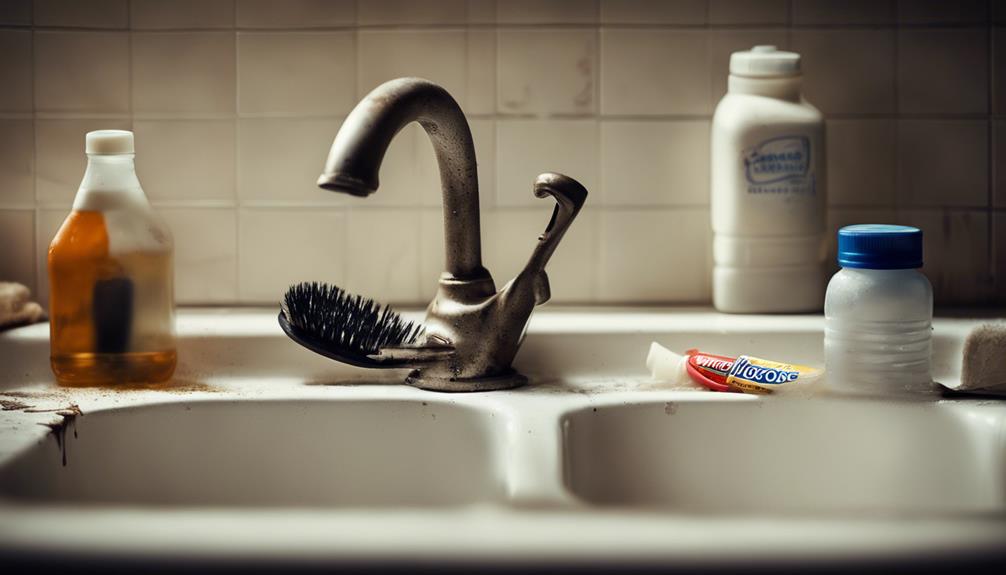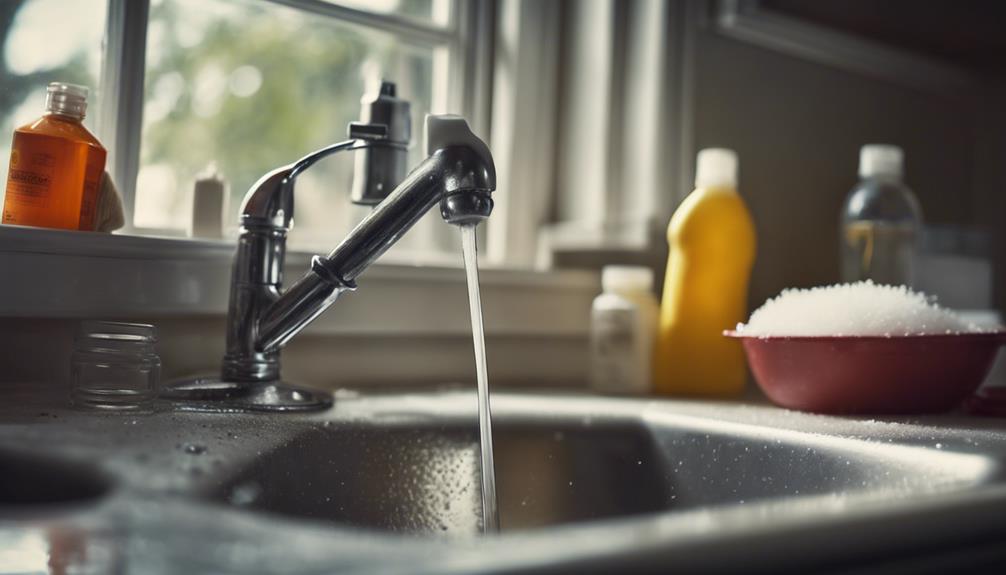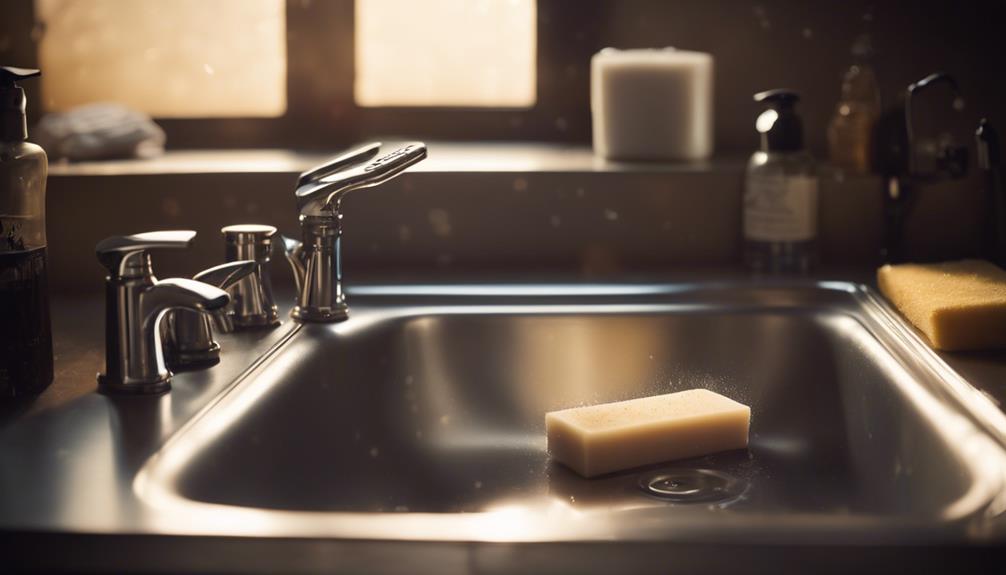You can greatly extend the lifespan of your kitchen sink by establishing a regular cleaning routine and using the right cleaning products and techniques for your specific sink material. Start by investing in a soft sponge, mild dish soap, and warm water for daily cleaning. Avoid abrasive tools and harsh chemicals that can damage your sink. For tough stains, turn to baking soda and white vinegar. By following these basics, you'll be well on your way to a sparkling clean sink. To really get your sink shining, explore more expert tips and tricks to keep your sink looking its best.
Cleaning Essentials for a Shiny Sink
To get started on achieving a shiny sink, you'll need a few simple yet effective cleaning essentials within arm's reach. These must-haves will help you clean your kitchen sink, including stainless steel sinks, with ease.
First, grab a soft sponge, mild dish soap, and warm water to maintain your sink's cleanliness. For tougher stains, mix baking soda and white vinegar to create a natural scrubbing paste. This combo is a game-changer for sink cleaning tips!
Next, use an old toothbrush to scrub hard-to-reach areas, and a soft sponge to wipe down the sink basin. Daily cleaning is key, so make sanitizing your kitchen a habit. For an extra layer of cleanliness, soak paper towels in vinegar and wipe down the sink to disinfect and deodorize.
Protecting Your Sink From Damage
To keep your sink looking its best, you'll want to take steps to prevent damage from occurring in the first place.
By following some simple guidelines, you can avoid common pitfalls that can leave your sink scratched, dented, or discolored.
Now, let's explore some key strategies for protecting your sink, including avoiding abrasive cleaning tools, preventing water spot formation, and cleaning up food debris.
Avoid Abrasive Cleaning Tools
When cleaning your kitchen sink, steer clear of abrasive tools like steel wool, which can leave unsightly scratches and dull the surface. These harsh cleaning tools can cause significant damage to your sink, reducing its lifespan and aesthetic appeal.
Avoid using scouring powders on your sink, as they can create deep scratches on materials like stainless steel, fireclay, and granite composite. If you have a copper sink, using abrasive cleaners can strip away its unique patina and shine, affecting its overall appearance.
Instead, opt for gentle cleaning methods to maintain your sink's beauty and longevity. Avoid abrasive cleaners and tools, and instead choose gentle cleansers and soft cloths to wipe down your sink. This will help prevent damage and maintain your sink remains in pristine condition.
Prevent Water Spot Formation
You can prevent water spots from forming on your sink by drying it thoroughly with a microfiber cloth after each use, thereby maintaining a shiny finish and protecting your sink from damage.
Water spots can be a real nuisance, but they're easily preventable. They're often caused by hard water minerals and soap residue left to dry on the sink surface. By regularly drying your sink, you can prevent water spots from forming and keep your sink looking pristine.
If you do notice water spots, don't worry – using a cleaner specifically designed to remove hard water spots can help. By taking these simple steps, you can extend the lifespan of your sink and keep it looking beautiful for longer.
Clean Up Food Debris
Food debris lingering in your sink can wreak havoc, causing scratches and stains that can lead to costly repairs down the line. To avoid this, make cleaning up food debris a daily habit.
Start by scraping off excess food from your dishes into the trash or compost bin. Then, rinse your dishes thoroughly before washing them with soap and warm water. For tougher messes, mix baking soda and water to create a paste, and apply it to the affected area. Let it sit for a few minutes before rinsing with warm water.
For stainless steel sinks, use a gentle cleanser and a soft cloth to wipe down the sink basin. Regularly cleaning up food debris will also help prevent clogs and odors in your drain. By making this a daily habit, you'll be protecting your kitchen sink from damage and maintaining its cleanliness and longevity.
Removing Stains and Grime Effectively

When you're ready to tackle those tough stains and grime buildup in your kitchen sink, it's crucial to identify the type of stain you're dealing with and choose the right removal method.
You'll learn how to identify common stains and grime, and discover effective methods for removing them, including solutions for particularly stubborn stains.
Stain Identification Guide
When tackling stubborn stains and grime on your kitchen sink, identifying the type of stain is vital, as different stains require specific cleaning methods for effective removal. To start, take a closer look at the stain and its characteristics. On stainless steel sinks, rust stains appear as reddish-brown marks with a rough texture. If you have a porcelain sink, hard water stains will manifest as white, chalky deposits that are difficult to remove. Ceramic sinks, on the other hand, may develop grease stains, which can be identified by their oily residue and sticky texture.
Enamel sinks, meanwhile, are prone to soap scum buildup, which appears as a cloudy film that can be stubborn to clean. Finally, food stains can occur on any sink material and may vary in color and texture. To remove these stains effectively, it's important to identify them correctly. By recognizing the type of stain you're dealing with, you can choose the right cleaning method and products for effective removal.
In the next section, we'll explore the best methods for removing these common kitchen sink stains.
Grime Removal Methods
With your sink's stains identified, it's time to tackle the grime and get your kitchen sink sparkling again. Effective grime removal methods are key to maintaining a clean and hygienic kitchen.
For tough stains and grime, try using baking soda and vinegar – a natural and eco-friendly solution. Alternatively, scrub your sink with a soft sponge and dish soap to eliminate grime buildup effectively.
If you have a fireclay or granite composite sink, consider using a Magic Eraser for stubborn stains. For copper sinks, lemon juice and vinegar can be an effective combination for removing grime and stains.
Remember, regular maintenance and proper cleaning techniques are essential for keeping your sink free of grime and stains. By incorporating these methods into your cleaning routine, you'll be able to enjoy a sparkling clean sink that shines like new.
With the right tools and techniques, you'll be well on your way to a grime-free kitchen sink.
Tough Stain Solutions
Tackle tough stains head-on by deploying a trio of powerful cleaning agents: baking soda, lemon juice, and vinegar. These can be mixed and matched to create customized solutions for even the most stubborn grime buildup. By combining these agents, you'll be equipped to tackle even the toughest stains and grime.
Here are some effective solutions to try:
- Mix baking soda and lemon juice to create a paste that's perfect for removing tough stains from your kitchen sink.
- Combine baking soda and vinegar to create a powerful paste that can break down even the most stubborn grime buildup.
- For particularly stubborn stains, try mixing hydrogen peroxide and baking soda to create a solution that's tough on stains but gentle on your sink.
- For fireclay and granite composite sinks, try scrubbing with a Magic Eraser to remove difficult stains.
- Remember to avoid harsh chemicals and abrasive cleaners, which can damage the finish of your sink. By using these gentle yet effective solutions, you'll be able to keep your sink clean and well-maintained with ease.
Daily Care for a Clean Sink
By incorporating a daily wiping routine, you can greatly decrease the buildup of bacteria and germs that can lead to unpleasant odors and unsanitary conditions in your kitchen sink.
In fact, did you know that 45% of kitchen sinks harbor coliform bacteria? To keep your kitchen sink clean and hygienic, make it a habit to wipe it down daily with an all-purpose cleaner. This daily tip will help prevent the buildup of bacteria and keep your sink smelling fresh.
Additionally, refresh your garbage disposal with citrus rinds to keep your sink smelling fresh.
Follow these daily cleaning tips to make regular upkeep easier and maintain a hygienic kitchen sink.
Remember to properly disinfect your sink after handling raw chicken or pet bowls to prevent cross-contamination.
Deep Cleaning Your Kitchen Sink

Scrubbing away stubborn grime and bacteria, you'll need to get down to business and give your kitchen sink a thorough deep cleaning every now and then. This involves more than just a quick wipe-down; you'll need to break out the big guns to really get your sink sparkling.
Here are some effective cleaning methods to keep in mind:
- Mix baking soda and white vinegar to create a paste, and use it to scrub away grime and bacteria from the sink walls, faucet, and drains.
- Disinfect the sink with a solution of vinegar and water to kill germs and odors.
- Regularly clean dish brushes and sponges to prevent bacterial buildup in the sink.
- Maintain a clean garbage disposal with baking soda and vinegar to prevent foul smells in the sink area.
- Deep cleaning your sink will help prevent the buildup of grime and bacteria, keeping your kitchen clean and hygienic.
Special Care for Different Materials
When it comes to maintaining your kitchen sink, you'll need to tailor your cleaning approach to the specific material it's made of, as different surfaces require distinct care to stay in top condition.
Using the right cleaning supplies is essential to make sure your sink stays safe and clean. For instance, stainless steel sinks should be wiped in the direction of the grain to maintain their shine and prevent scratches. Fireclay and granite composite sinks require gentle cleaning with non-abrasive materials to prevent damage. Copper sinks can be cleaned effectively with lemon juice, vinegar, and mild dish soap to maintain their unique patina.
Avoid using abrasive cleaners, bleach, steel wool, and scouring powders on different sink materials to prevent scratches and damage. By using the right cleaning supplies and techniques, you can extend the lifespan of your sink and keep it looking beautiful.
Proper maintenance and special care of sink materials can help prevent scratches and maintain their shine.
Maintaining a Sanitary Sink Environment

You'll be shocked to learn that your kitchen sink is one of the germiest spots in your home, making daily cleaning a must to prevent bacteria buildup. By incorporating a few simple habits into your daily routine, you can keep your sink area clean and hygienic.
Here are some essential tips to maintain a sanitary sink environment:
- Clean your sink daily with a natural surface cleaner and microfiber cloth to wipe down the area.
- Disinfect the sink after handling raw chicken or pet bowls to eliminate any potential harmful bacteria.
- Implement a regular cleaning routine to maintain a clean and hygienic sink environment.
- Keep the sink area dry to discourage bacteria growth and promote a healthier kitchen environment.
- Don't forget to clean your garbage disposal regularly to prevent bacteria buildup.
Preventing Common Sink Problems
To guarantee the protection of your kitchen sink from common problems that can lead to costly repairs or replacements down the line, it's crucial to regularly clean and maintain your sink. By following specific cleaning guidelines based on your sink material and implementing preventative measures like using sink strainers and avoiding harsh cleaning agents, you can prevent odors, stains, and bacterial buildup.
Proper care and cleaning routines are vital in extending the lifespan of your sink and maintaining its new appearance. Neglecting sink maintenance can result in expensive repairs or replacements in the future.
To prevent common sink problems, it's important to adhere to specific cleaning guidelines based on your sink material. Utilizing preventative measures such as employing sink strainers and refraining from using harsh cleaning agents can help steer clear of common sink issues.
Conclusion
You've made it to the end of our kitchen sink care guide! By now, you're equipped with the top tips to keep your sink shining, protected, and hygienic.
But, let's be real – a clean sink is only as good as the effort you put in.
So, will you commit to daily care and regular deep cleaning to keep your sink looking brand new?